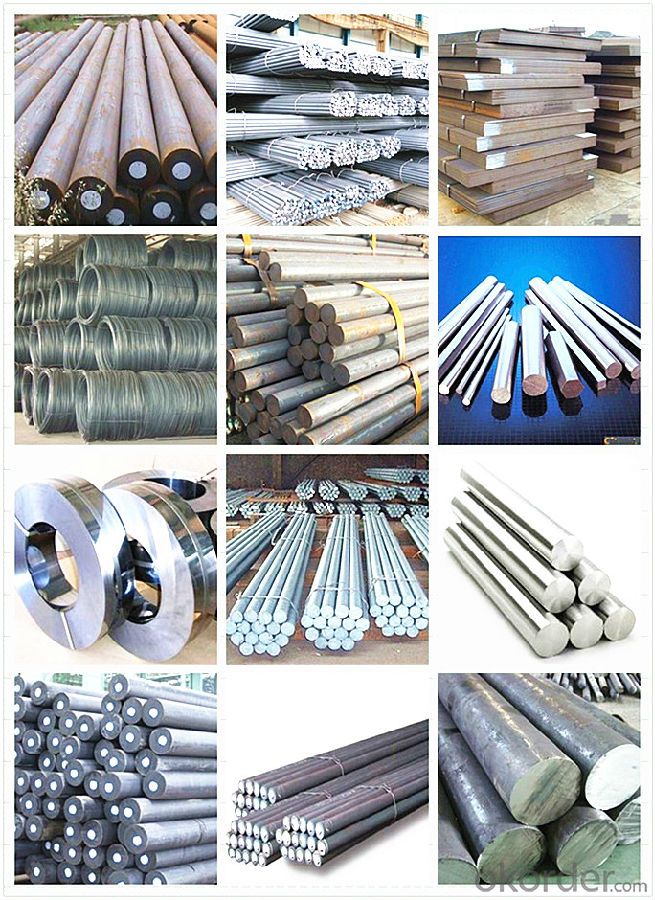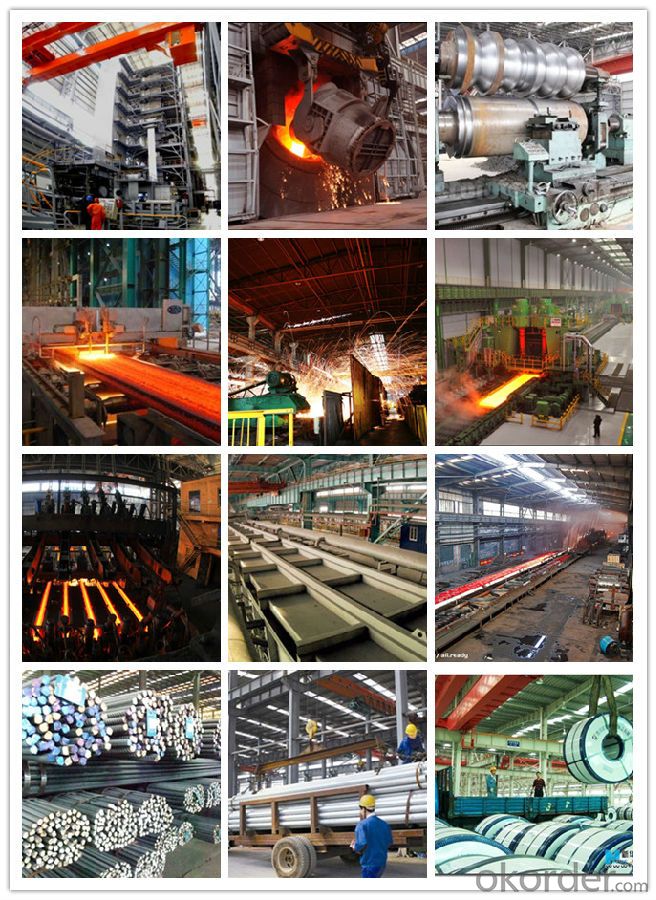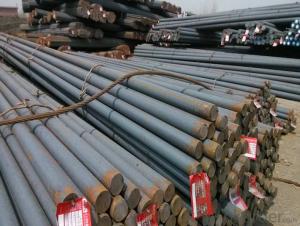Special Steel Carbon Steel Round Bar S20C AISI 1020
- Loading Port:
- China main port
- Payment Terms:
- TT OR LC
- Min Order Qty:
- 30 m.t.
- Supply Capability:
- 10000 m.t./month
OKorder Service Pledge
OKorder Financial Service
You Might Also Like
Item specifice
Product Information
◊ Standards and Chemical Composition:
Carbon Structural Steel Bar 20#(GB) | ||||||
Standards | Model | Chemical Composition (%) | ||||
C | Si | Mn | S(≤) | P(≤) | ||
GB | 20# | 0.17-0.23 | 0.17-0.37 | 0.35-0.65 | 0.035 | 0.035 |
DIN | C22(1.0402) | 0.17-0.24 | 0.40(max) | 0.40-0.70 | 0.045 | 0.045 |
BS | IC22 | 0.17-0.24 | 0.40(max) | 0.30-0.60 | 0.04 | 0.045 |
AISI/ATEM/SAE | 1020 | 0.18-0.23 | 0.15-0.35 | 0.30-0.60 | 0.05 | 0.03 |
JIS | S20C | 0.18-0.23 | 0.15-0.35 | 0.30-0.60 | 0.035 | 0.03 |
◊ Mechanical Property:
Carbon Structural Steel Bar 20#(GB) | |||||
Yield Strength(MPa) | Tensile Strength(MPa) | Elongation(%) | AKV(J) | Reduction in Area(%) | Hardness(HB) |
245 | 410 | 25 | 54 | 55% | 156 |
◊ Application:
We can see that the carbon steel bar has higher plasticity, better toughness and better welding performance. This kind of steel is good material in mading Lever shaft, Transmission shift folk, Heavy machinery trolley, Wheel gear, Mental loop, press forging parts, Rack rod, wear-resistant parts, for mold steel, etc.
Product Show

Workshop Show

Shipping
1. FedEx/DHL/UPS/TNT for samples, Door-to-Door;
2. By Air or by Sea for batch goods, for FCL; Airport/ Port receiving;
3. Customers specifying freight forwarders or negotiable shipping methods!
Delivery Time: 3-7 days for samples; 5-25 days for batch goods.
Payment Terms
1.Payment: T/T, L/C, Western Union, MoneyGram,PayPal; 30% deposits; 70% balance before delivery.
2.MOQ: 1pcs
3.Warranty : 3 years
4.Package Informations: 1) EXPORT, In 20 feet (GW 25 ton) or 40 feet Container (GW 25 ton)
2)as customer's requirement
Why choose us?
(1) The leading exporter in China special steel industry.
(2) Large stocks for various sizes, fast delivery date.
(3) Good business relationship with China famous factories.
(4) More than 7 years steel exporting experience.
(5) Good after-sales service guarantee.
- Q:How does special steel contribute to the manufacturing of turbine blades?
- Special steel plays a crucial role in the manufacturing of turbine blades as it offers exceptional mechanical properties, such as high strength, corrosion resistance, and heat resistance. These properties enable turbine blades to withstand extreme operating conditions, including high temperatures and pressures. Additionally, the specific composition of special steel allows for precise shaping and intricate designs, which optimize the aerodynamic efficiency of the blades. Overall, special steel enables the production of turbine blades that are durable, efficient, and capable of withstanding the demanding conditions of power generation.
- Q:What are the main characteristics of spring steel?
- Spring steel is a type of high-carbon steel known for its exceptional elasticity and resilience. Its main characteristics include high tensile strength, excellent fatigue resistance, and the ability to withstand repeated bending or twisting without permanent deformation. Spring steel also exhibits good corrosion resistance, making it suitable for various applications where durability and flexibility are required, such as springs, clips, and automotive components.
- Q:What are the different types of tool steel?
- There are several different types of tool steel, including high-speed steel, cold work steel, hot work steel, and plastic mold steel. Each type of tool steel is specifically designed for different applications and has unique properties that make it suitable for specific tasks.
- Q:How is mold steel used in the production of plastic injection molds?
- Mold steel is commonly used in the production of plastic injection molds due to its high durability and resistance to wear and tear. It is used to create the main components of the mold, such as the cavity and core, which are responsible for shaping the plastic material. Mold steel provides the necessary hardness and strength to withstand the high pressures and temperatures involved in the injection molding process. Additionally, its excellent machinability allows for precise and intricate mold designs, ensuring the production of high-quality plastic parts.
- Q:Can special steel be used in the production of cutting tools?
- Yes, special steel can be and is commonly used in the production of cutting tools. Special steel, such as high-speed steel or tool steel, is specifically engineered to have superior hardness, toughness, and wear resistance, making it ideal for manufacturing various types of cutting tools like drills, saw blades, milling cutters, and lathe tools.
- Q:How is high-temperature alloy steel used in the production of heat exchangers?
- High-temperature alloy steel is used in the production of heat exchangers due to its exceptional resistance to high temperatures and corrosion. It allows heat exchangers to efficiently transfer heat between two fluids while maintaining structural integrity. The alloy steel's properties, such as high strength and thermal stability, ensure long-lasting performance and reliability in demanding industrial processes.
- Q:What are the different methods for joining special steel components?
- There are several methods for joining special steel components, each with its own advantages and limitations. Some of the common methods include: 1. Welding: This is one of the most widely used methods for joining steel components. It involves melting the edges of the components and fusing them together. Welding can be done using various techniques such as arc welding, gas welding, or laser welding, depending on the specific requirements of the project. 2. Bolting: Bolting involves using bolts, nuts, and washers to join steel components together. This method is preferred for applications where disassembly or maintenance may be required. It provides a strong and reliable connection but may not be suitable for high-stress applications. 3. Riveting: Riveting involves using metal fasteners called rivets to join steel components together. This method is commonly used in applications where high strength and resistance to vibration are required. Riveting is a permanent joining method that provides a strong and durable connection. 4. Adhesive bonding: Adhesive bonding involves using high-strength adhesives to join steel components together. This method is preferred for applications where aesthetics and weight reduction are important. Adhesive bonding can provide a strong and durable connection, but the surface preparation and adhesive selection are critical for ensuring the bond's strength. 5. Mechanical fastening: Mechanical fastening methods, such as using screws or clips, can also be used to join special steel components. This method is often used for temporary connections or for components that need to be easily assembled and disassembled. Each joining method has its own advantages and considerations, and the choice of method depends on factors such as the specific application, load requirements, lifespan expectations, cost considerations, and the nature of the steel components being joined. It is important to carefully evaluate these factors and consult with experts to determine the most suitable joining method for a given project.
- Q:Is special steel suitable for medical equipment manufacturing?
- Yes, special steel is suitable for medical equipment manufacturing. Special steel, also known as stainless steel, is commonly used in the production of medical equipment due to its unique properties. It is highly corrosion-resistant, which is crucial for maintaining the hygiene and cleanliness standards required in medical settings. Special steel also has excellent strength and durability, ensuring that the equipment can withstand frequent use and sterilization processes without compromising its quality. Additionally, special steel can be easily molded and shaped into various intricate designs, making it ideal for manufacturing complex medical instruments and devices. Overall, the use of special steel in medical equipment manufacturing ensures the production of reliable and long-lasting products that meet the stringent requirements of the healthcare industry.
- Q:What are the different machining techniques for special steel?
- There are several machining techniques that can be used for special steel, depending on the specific requirements and characteristics of the steel. Some common machining techniques include turning, milling, drilling, grinding, and broaching. Each technique has its own advantages and is chosen based on factors such as the desired shape, size, and surface finish of the steel component. Additionally, advanced techniques like electrical discharge machining (EDM) and laser cutting can be employed for special steel, offering precise and efficient machining solutions.
- Q:Can special steel be used in the electronics industry?
- Yes, special steel can be used in the electronics industry. It is commonly used for various components such as connectors, springs, and contacts due to its high strength, corrosion resistance, and electrical conductivity properties.
1. Manufacturer Overview |
|
|---|---|
| Location | |
| Year Established | |
| Annual Output Value | |
| Main Markets | |
| Company Certifications | |
2. Manufacturer Certificates |
|
|---|---|
| a) Certification Name | |
| Range | |
| Reference | |
| Validity Period | |
3. Manufacturer Capability |
|
|---|---|
| a)Trade Capacity | |
| Nearest Port | |
| Export Percentage | |
| No.of Employees in Trade Department | |
| Language Spoken: | |
| b)Factory Information | |
| Factory Size: | |
| No. of Production Lines | |
| Contract Manufacturing | |
| Product Price Range | |
Send your message to us
Special Steel Carbon Steel Round Bar S20C AISI 1020
- Loading Port:
- China main port
- Payment Terms:
- TT OR LC
- Min Order Qty:
- 30 m.t.
- Supply Capability:
- 10000 m.t./month
OKorder Service Pledge
OKorder Financial Service
Similar products
New products
Hot products
Related keywords






























